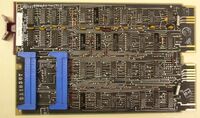Difference between revisions of "DRV11 Parallel Line Unit"
(+flat cables, +links to manual, FMPS) |
m (→Further reading: +DR11-C vs. DRV11) |
||
| (One intermediate revision by the same user not shown) | |||
| Line 42: | Line 42: | ||
| colspan=16 | ''IN15 <-> IN0'' | | colspan=16 | ''IN15 <-> IN0'' | ||
{{16bit-bitout}} | {{16bit-bitout}} | ||
| + | |||
| + | ==Further reading== | ||
| + | |||
| + | * ''DR11-C vs. DRV11'', [[MicroNote]] #018 | ||
==External links== | ==External links== | ||
| − | * [http://www.bitsavers.org/pdf/dec/pdp11/1103/EK-LSI11-TM-002.pdf LSI-11, PDP-11/03 user's manual] (EK-LSI11-TM-002) - the DRV11 is covered in | + | * [http://www.bitsavers.org/pdf/dec/pdp11/1103/EK-LSI11-TM-002.pdf LSI-11, PDP-11/03 user's manual] (EK-LSI11-TM-002) - the DRV11 is covered in Sections 4.8 (pp. 73-77 of the PDF) and 6.3 (pp. 96-106) |
* [https://manx-docs.org/collections/hcps/DRV11.pdf DRV11 Field Maintenance Print Set] (MP00054) | * [https://manx-docs.org/collections/hcps/DRV11.pdf DRV11 Field Maintenance Print Set] (MP00054) | ||
[[Category: QBUS Parallel Interfaces]] | [[Category: QBUS Parallel Interfaces]] | ||
Latest revision as of 11:30, 27 July 2024
The DRV11 Parallel Line Unit was a QBUS parallel interface device controller which provided a pair of 16-bit parallel ports, one input, and one output. It was a dual format card (M7941); it used programmed I/O. It was fully program compatible with the UNIBUS DR11-C general device interface.
Connection to the user's device was via a pair of 40-pin Berg connectors, into which flat cables could plug. Data going out to the user's device was latched in the DRV11, so may be read at leisure; data coming in from the user's device was merely sampled by the DRV11, so must be held until it has been read.
Contents
Registers
The device had three control and buffer registers, which could be configured to any three sequential word locations in the I/O page. The first DRV11 was normally configured to addresses 767770-767774; the second to 767760-767764, the third to 767750-767754, and so on.
| Register | Abbreviation | Address |
|---|---|---|
| Control and Status Register | DRCSR | 767770 |
| Output Buffer Register | DROUTBUF | 767772 |
| Input Buffer Register | DRINBUF | 767774 |
In the register contents (below), bits which are read/write or unused are shown in normal font, those which are read-only are in italics.
Status Register (DRCSR)
| REQ B | Unused | REQ A | INT ENB A | INT ENB B | Unused | CSR1 | CSR0 | ||||||||
| 15 | 14 | 13 | 12 | 11 | 10 | 09 | 08 | 07 | 06 | 05 | 04 | 03 | 02 | 01 | 00 |
- REQ B - Request B - Signal from user's hardware which can be tested, or cause an interrupt (below)
- REQ A - Request A
- INT ENB A - Interrupt Enable A - When set, allows setting REQ A to cause an interrupt
- INT ENB B - Interrupt Enable B
- CSR1 - Signal to user's hardware (on connector 1)
- CSR0 - Signal to user's hardware (on connector 2)
Output Buffer Register (DROUTBUF)
| OUT15 <-> OUT0 | |||||||||||||||
| 15 | 14 | 13 | 12 | 11 | 10 | 09 | 08 | 07 | 06 | 05 | 04 | 03 | 02 | 01 | 00 |
Input Buffer Register (INBUF)
| IN15 <-> IN0 | |||||||||||||||
| 15 | 14 | 13 | 12 | 11 | 10 | 09 | 08 | 07 | 06 | 05 | 04 | 03 | 02 | 01 | 00 |
Further reading
- DR11-C vs. DRV11, MicroNote #018
External links
- LSI-11, PDP-11/03 user's manual (EK-LSI11-TM-002) - the DRV11 is covered in Sections 4.8 (pp. 73-77 of the PDF) and 6.3 (pp. 96-106)
- DRV11 Field Maintenance Print Set (MP00054)
